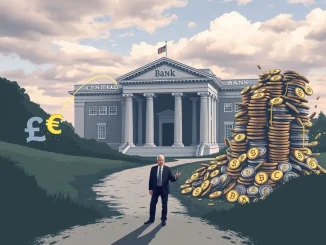
Hong Kong is doubling down on its ambition to become a global hub for Hong Kong digital assets. Following up on its initial foray into virtual asset regulation, the government has just unveiled its second major policy statement, signaling a clear path forward for the industry. This latest move solidifies Hong Kong’s proactive approach to shaping its crypto policy and creating a robust ecosystem for digital asset growth.
What Does the New Digital Asset Regulation Mean for Virtual Assets in Hong Kong?
The core of this second statement focuses on building upon the foundations laid by the first. While the initial policy statement primarily addressed regulations for virtual asset exchanges and the approval of ETFs, this new document broadens the scope significantly. A key highlight is the commitment to establishing a unified regulatory framework for a wider range of digital asset service providers.
This unified approach aims to provide clarity and certainty for businesses operating in the space, from trading platforms to custodians and beyond. The goal is to protect investors while simultaneously fostering innovation and market integrity. By bringing more activities under a clear regulatory umbrella, Hong Kong seeks to enhance confidence in its virtual assets market.
Think of it as moving from regulating specific types of venues (like exchanges) to creating a more comprehensive rulebook for the various services involved in the digital asset lifecycle. This measured but progressive digital asset regulation is crucial for attracting both institutional and retail participation.
How is Tokenization Driving Innovation in Hong Kong Digital Assets?
Another major focus of the policy statement is the promotion of tokenization. Hong Kong is actively encouraging the issuance of tokenized bonds and providing incentives for the tokenization of real-world assets (RWAs).
Why is tokenization so important? It unlocks potential benefits such as increased liquidity, fractional ownership of large assets, and greater efficiency in settlement processes. Imagine tokenizing real estate, art, or even intellectual property – making them more accessible to a wider range of investors. Hong Kong sees this as a key area for growth and is putting policies in place to facilitate it.
Key initiatives mentioned include:
- Promoting the issuance of tokenized government green bonds.
- Exploring use cases for tokenized deposits and other financial instruments.
- Working with the industry to address legal and technical challenges associated with RWA tokenization.
This focus on practical applications of tokenization demonstrates Hong Kong’s commitment to leveraging blockchain technology for tangible economic benefits within its Hong Kong digital assets strategy.
Advancing Virtual Assets and Stablecoins: A Key Part of Hong Kong’s Crypto Policy
The statement also highlights the development of use cases for stablecoins and enhancing cross-sector collaboration. Stablecoins, digital assets designed to maintain a stable value relative to a traditional currency or other reference asset, are seen as crucial building blocks for the broader digital asset ecosystem.
Developing clear guidelines and fostering environments where stablecoins can be used effectively in payments, trading, and other financial activities is a priority. Cross-sector collaboration, involving financial institutions, technology firms, and regulators, is essential to explore these use cases and build the necessary infrastructure.
This aspect of the crypto policy aims to integrate virtual assets more deeply into the traditional financial system, paving the way for more seamless interactions and wider adoption. The focus is on ensuring that as the market for virtual assets grows, the underlying infrastructure and regulatory environment support secure and efficient operations.
Building the Ecosystem: Talent and Partnerships for Hong Kong Digital Assets
Finally, the policy statement emphasizes advancing talent development and strategic partnerships. Building a thriving digital asset hub requires skilled professionals and strong connections with global players.
Hong Kong plans to invest in educational initiatives and training programs to cultivate local talent in areas like blockchain technology, smart contract development, and digital asset management. Strategic partnerships with international firms, industry associations, and other jurisdictions are also key to sharing knowledge, fostering innovation, and ensuring Hong Kong remains competitive on the global stage for Hong Kong digital assets.
This holistic approach recognizes that technology and regulation must be supported by a strong human capital base and collaborative networks to truly succeed in establishing a leading position in the global virtual assets landscape.
The Path Forward for Hong Kong Digital Assets
Hong Kong’s second policy statement is a significant step forward, building upon the foundation of its initial crypto policy moves. By focusing on clear digital asset regulation, promoting tokenization, exploring stablecoin use cases, and investing in talent and partnerships, the government is creating a comprehensive framework designed to foster growth while managing risks.
While challenges remain, such as keeping pace with rapid technological changes and coordinating with international regulatory efforts, the clear direction set by this policy statement provides a strong signal to the market. Hong Kong is positioning itself not just as a participant, but as a leader in the evolving world of virtual assets and tokenization.
The future of Hong Kong digital assets appears brighter than ever, as the city actively works to unlock the potential of this transformative technology.



